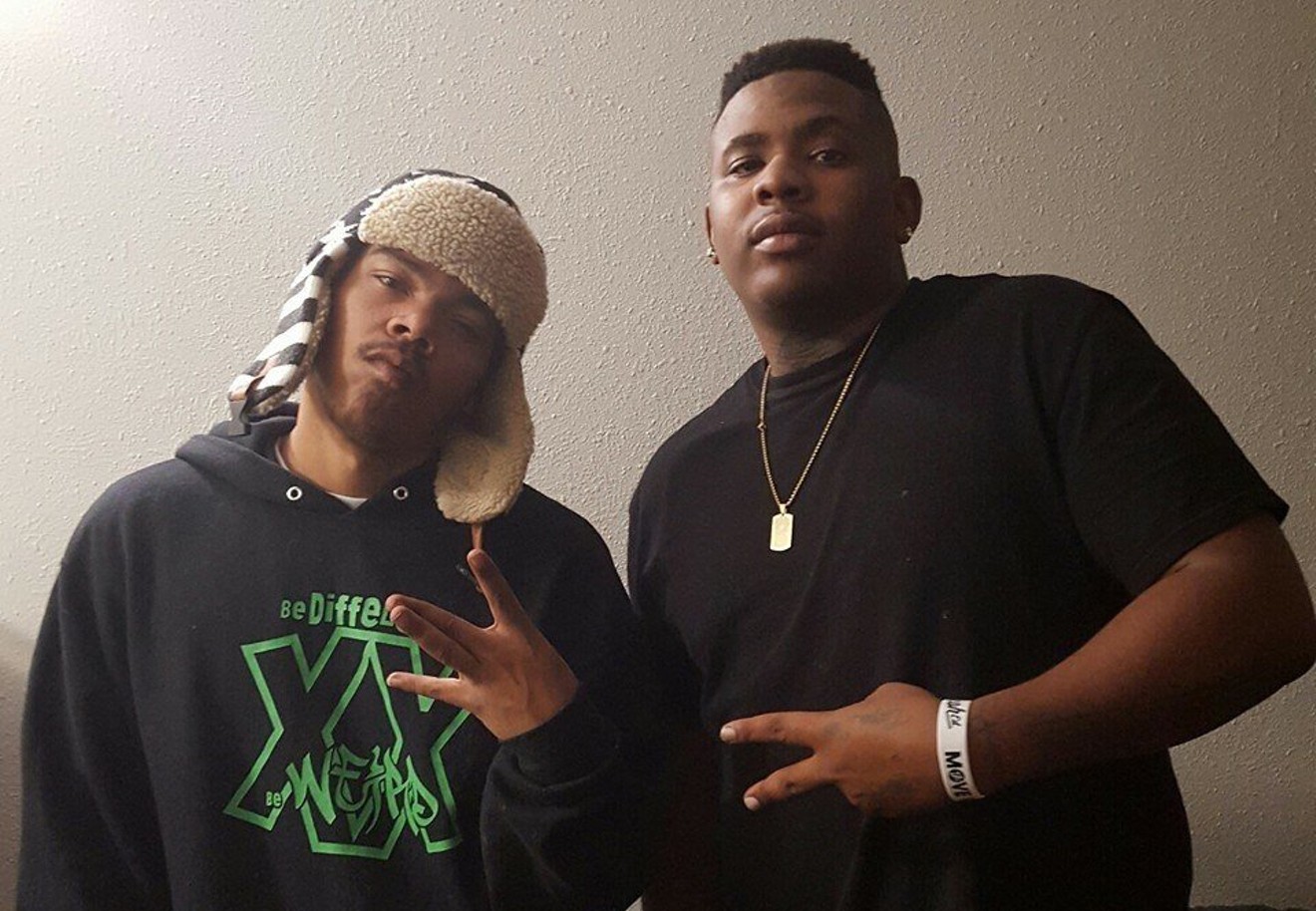Brandon Connor, aka the rapper Young Fait, was still in the womb on the day his mother was washing dishes and dropped a plate. She bent over to pick up the broken pieces and narrowly dodged a bullet as it blasted through a window and into her refrigerator door. When she stood, she placed her belly against the bullet hole; had she not bent over, she and her baby would have been shot.
His mother attributes their survival to his intelligence, says Connor, the 27-year-old founder of Weird Musik, an Aurora-based anti-commercial hip-hop label. His mother tells him he made her bend over just in the nick of time. It was kind of like a Hollywood story, he laughs.
Connor’s father was a pimp; his mother was a prostitute. Her assumption when that bullet flew through her kitchen was that her child’s father was trying to murder her.
After Connor was born, she fled with him to Arizona, where she raised her son until he was nine. When he started getting into trouble, stealing, his mother sent him back to Los Angeles to live with his father.
Toward the end of his freshman year in high school, Connor was expelled and sent to a probation school after he broke a peer’s jaw. There he started writing with gusto, trying to save his life with words.
“I was always getting into fights,” Connor says. “I was always a troubled kid. I was trying to use my writing to get out of it, to get out of situations or describe my fights.”
At fifteen, he recorded his first album. “I played it for students at probation school, and they all laughed at it and told me to give up.”
Even his teacher scoffed at him, so Connor quit writing music for two years. He started traveling more frequently between L.A. and Arizona. At seventeen, he found out his girlfriend was pregnant, so he moved to L.A. to settle down and become a father. Instead, he started dealing drugs. “I was like the worst drug dealer in the world,” he says.
One day, a friend of his dad’s, Daks Beats, saw Connor standing on the corner, hustling. Beats threatened to rat Connor out to his dad if he didn’t promise to quit dealing.
Beats invited Connor to a recording studio to learn to produce music on a few conditions: Connor would not drink, smoke or do drugs and would dedicate himself to music.
Beats taught him to rap with precision and helped Connor record his first professional album. Soon after, Connor moved to a college town in Arizona and immersed himself in the underground music scene, playing frequent concerts, including backyard boogies and hip-hop house shows.
“When I first got my local fame out there, it kinda got to my head, so we were doing a lot of stuff that we weren’t supposed to — getting into fights,” Connor says. “Then one of the artists I was getting into it with shot up my house.”
So he returned to Los Angeles, where he became embroiled in family drama. His relatives encouraged him to make a fresh start in Colorado, and in 2012, he moved to Denver with his son and his girlfriend, whose traditional Christian family lived here. They began staying at the family’s home, but her relatives disliked Connor and his not-so-religious ways and gave him the boot, separating him from his child and girlfriend. He had a second child with one of her close friends; that relationship did not last, and he is now estranged from both children.
He landed on the streets, begging for money and food. A Walmart employee who frequently offered Connor spare change hooked him up with an interview and dress clothes, and he landed a job at a local branch. He started renting an apartment and working on music, but eventually he failed a drug test and was fired.
He fell into depression, lost his apartment and found himself homeless again — until he met his now-girlfriend, fellow hip-hop artist T-May. They moved in with her mom, who eventually kicked them out. They lived on the streets and in motels together until they saved enough for an apartment in Aurora, the same one they still live in. “It feels good to have a master bedroom,” Connor says.
Finally stable, he started performing again. He was lured by bookers to high-profile pay-to-play shows, in which he would be required to sell tickets and hand over a down payment that he might not get back if he didn’t bring in enough fans. But finding fans was hard. After all, he was still new to the scene.
Connor started playing larger venues, including the Gothic Theatre, the Roxy, the Bluebird and Cervantes’, and he earned admirers after opening for Krizz Kaliko. In the following years, he connected with Top Flite and recorded with Trev Rich, who recently signed a deal with Cash Money Records and is Denver’s latest hometown hip-hop golden boy, one that Connor says he doesn’t see now that his old collaborator has gone big.
Connor paid to play large venues around town, and now blasts as “backwards” the economic model many promoters have set up in which artists have to promote themselves and pay to play instead of getting paid directly.
He decries Denver radio stations for failing to play up-and-coming hip-hop artists, successful Denver rappers for failing to give enough back to the community, hip-hop venues for fostering a climate of violence, and promoters for creating booze-soaked events that exploit artists.
“There are so many talented artists in this city, but hip-hop is still on the bottom because of our leaders,” he explains. “Our leaders have not yet taken the chance to start changing the rules.
“Everyone follows the same formula in Colorado,” he continues. “Record. Soundcloud. Make a bunch of albums that they can’t sell. Do shows. Soundcloud. Make a bunch of albums that they can’t sell. And they’re doing this for years and years and years and years.”
It’s not just the local hip-hop scene that he says is failing. “We have so many artists...Lil Wayne, Young Thug — all these artists who are breaking the hip-hop rules,” Connor says. “If you look on their album, it says it’s a hip-hop album. They have literally come in and poisoned [hip-hop] and tarnished it. If someone tarnishes your name, you’re gonna have to change it.”
Connor and T-May founded Weird Musik and have left the term “hip-hop” — if not the sound — behind. Weird Musik is a new genre, as Connor tells it — a movement, a label, and music for weirdos and outcasts like he was growing up without support from his parents, mocked by friends and teachers.
He likens it to another offshoot of hip-hop: the Insane Clown Posse and the band’s infamous fans, the juggalos. He says he doesn’t listen to ICP’s music, but he respects the group’s ability to inspire dedicated fans.
Connor’s business philosophy dictates that if things aren’t working, do them differently. As he tells it, he has a different business model, a different message, a different relationship with his fans and family, and a different sound.
Sure, his music is basically hip-hop; he’s talented, as good a rapper as any in Denver, but not all that unique, at least when it comes to his sound. His tracks from 2015 and 2016 wrestle with common themes in the genre: fame, struggling with booze and personal frustrations. His recent tracks are smarter, more poetic and occasionally funny, much like the conscious hip-hop of the Roots, Talib Kweli and the Coup.
Connor maintains that he finds little inspiration in the hip-hop scene. “The only hip-hop person that’s ever inspired me is Eminem, and that’s just because he can say whatever he wanted when he wanted,” he explains. He is revolted by his generation, which he says has been hypnotized by technology and is intolerant of diverse political views. Like Eminem, he makes music for the kids coming up. Jim Morrison of the Doors, James Brown and opera serve as his inspiration.
Connor chats up his fans on social media — not about his music, but about their lives. The eight musicians and poets, all from Colorado, that he has signed to the Weird Musik label are like family to him. Many of them live with him and T-May, all supporting each other when they hit hard times.
His latest goal is to bring peaceful backyard boogies to the Front Range. Connor’s parties will have firm rules: no weapons, no gang paraphernalia, no fighting. All attendees will be checked by security. Booze will be served, money will be made, and the entire affair will likely garner the artists more income than they would earn from traditional venues.
At these backyard boogies, he will showcase his artists and not only pick talent, but also his fans, he says. No, he won’t prevent people from liking his music, but he will choose who gets to come. It’s the same mentality he has about his collaborators.
“For me, I’ve spent a good amount of years trying to get a feel for Colorado, and there is nobody I want to work with, honestly, outside of Weird Musik,” he says.
Find out more about Young Fait and his cadre of artists at weirdmusik.com.
[
{
"name": "Air - MediumRectangle - Inline Content - Mobile Display Size",
"component": "12017618",
"insertPoint": "2",
"requiredCountToDisplay": "2"
},{
"name": "Editor Picks",
"component": "17242653",
"insertPoint": "4",
"requiredCountToDisplay": "1"
},{
"name": "Inline Links",
"component": "18838239",
"insertPoint": "8th",
"startingPoint": 8,
"requiredCountToDisplay": "7",
"maxInsertions": 25
},{
"name": "Air - MediumRectangle - Combo - Inline Content",
"component": "17261320",
"insertPoint": "8th",
"startingPoint": 8,
"requiredCountToDisplay": "7",
"maxInsertions": 25
},{
"name": "Inline Links",
"component": "18838239",
"insertPoint": "8th",
"startingPoint": 12,
"requiredCountToDisplay": "11",
"maxInsertions": 25
},{
"name": "Air - Leaderboard Tower - Combo - Inline Content",
"component": "17261321",
"insertPoint": "8th",
"startingPoint": 12,
"requiredCountToDisplay": "11",
"maxInsertions": 25
}
]












